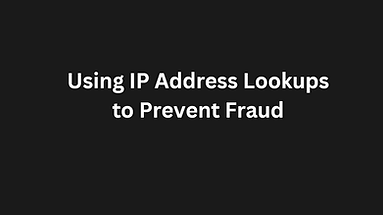In the current digital environment, safeguarding against fraud has become a critical concern for enterprises. With the increase in online transactions, account-based services, and digital engagements, the tactics employed by cybercriminals to exploit weaknesses are also evolving. A highly effective instrument for detecting and preventing fraudulent activities is the technology associated with IP address lookup. By examining the data linked to an IP address, organizations can identify potential threats and implement proactive measures to address them.
What is an IP Address Lookup?
Each device that connects to the internet is assigned a distinct identifier known as an IP (Internet Protocol) address. This address provides critical information regarding the device’s geographical location, the Internet Service Provider (ISP), and, in certain instances, the organization responsible for the connection. Tools for IP address lookup utilize databases to interpret this data, enabling businesses to detect inconsistencies and suspicious behavior.
For instance, when a user accesses their account or completes an online transaction, an IP lookup can determine if their location aligns with their typical activity patterns. Should the IP address indicate that the user is situated in a high-risk area or employing methods to conceal their actual location, this may indicate a potential risk of fraud.
How IP Address Lookups Help Prevent Fraud
IP address lookups are widely used across industries to combat fraud. Here are some of the key ways they can strengthen security:
- Detecting Unusual Locations One of the simplest and most effective uses of IP lookups is to spot location anomalies. For instance, if a user typically logs in from New York but suddenly attempts access from an IP address in a different country, this activity may warrant further investigation. Such anomalies can trigger alerts, blocking fraudulent attempts before they escalate.
- Identifying High-Risk Regions Cybercriminals often operate from specific regions known for fraudulent activities. IP lookups can identify when requests come from these areas, allowing businesses to flag or block them. For example, many companies restrict transactions from regions associated with high volumes of phishing or hacking activities.
- Detecting Proxy or VPN Use Fraudsters frequently use VPNs or proxies to disguise their actual locations. Advanced IP lookup services can detect when an IP address is associated with these tools. While many legitimate users use VPNs for privacy, recognizing this behavior allows companies to apply additional security checks for suspicious activities.
- Preventing Account Takeovers Account takeover fraud, where criminals gain unauthorized access to user accounts, is a growing threat. IP address lookups can help by identifying login attempts from unfamiliar or inconsistent locations. Paired with other security measures like two-factor authentication, this technology can effectively prevent unauthorized access.
Enhancing Fraud Detection with Geolocation
Geolocation, facilitated by IP address information, serves as an additional layer of security. Organizations can establish geofences—virtual perimeters that limit access according to geographic location. For instance, financial institutions may deny access from areas where a client usually does not conduct business. Likewise, geolocation data plays a crucial role in combating fraud in digital advertising by eliminating fraudulent clicks generated by bots or from unauthorized locations.
Balancing Security and User Experience
IP address lookups play a crucial role in fraud prevention; however, their implementation requires caution to prevent inconveniencing genuine users. Instances of false positives can lead to customer dissatisfaction, making it vital to integrate IP data with additional fraud detection techniques, including device fingerprinting and behavioral analytics. The application of machine learning can further improve this approach by identifying patterns and minimizing inaccuracies.
Conclusion
IP address lookups serve as a vital tool in combating fraud. They offer essential information that enables businesses to detect and address suspicious activities promptly. By incorporating IP lookups into a comprehensive security framework, organizations can enhance the protection of their customers and assets while ensuring a smooth user experience. As cyber threats advance, the utilization of IP address lookup technology will continue to be a fundamental element of contemporary fraud prevention.




